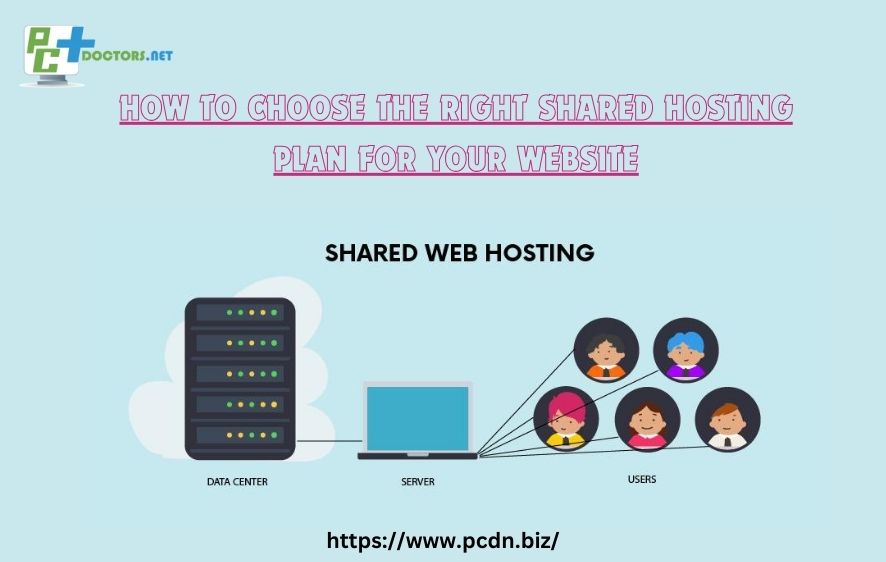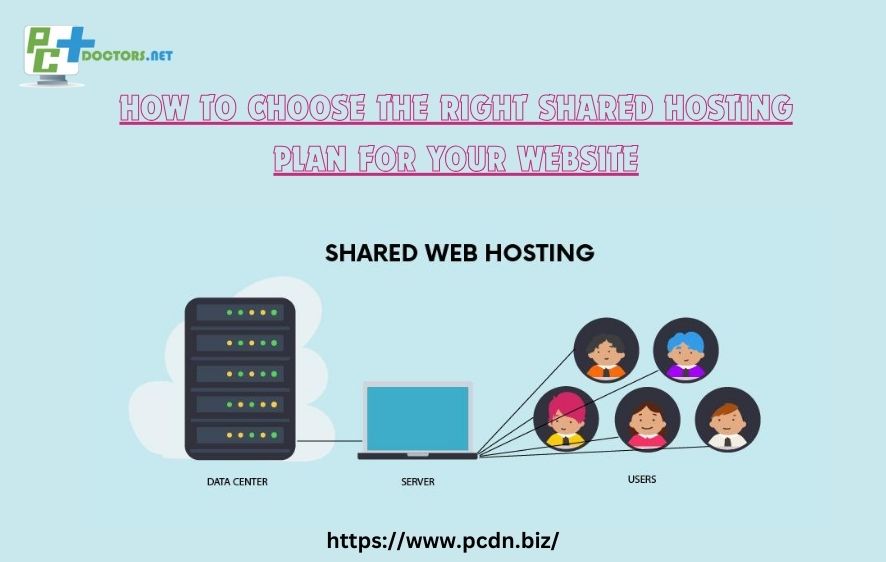How To Choose The Right Shared Hosting Plan For Your Website
Introduction:
In the ever-expanding digital landscape, having a strong online presence is crucial for businesses and individuals alike. One of the first steps towards establishing this presence is choosing the right shared hosting plan for your website. With numerous options available, it can be overwhelming to navigate the world of hosting services. In this article, we’ll guide you through the key factors to consider and introduce you to an excellent service provider, PC Doctors .NET, offering shared hosting plans that cater to diverse needs.
What is Shared Hosting?
Shared web hosting is a type of hosting service in which multiple websites are hosted on a single web server connected to the Internet. The expenses associated with server maintenance are distributed among numerous customers. With shared hosting, a website shares a physical server with one or more other websites.
Things to Look for When Purchasing a Shared Hosting Plan:
Uptime guarantee:
Website uptime is a key metric reflecting the reliability of a website, measured as the percentage of time a web hosting server remains online before experiencing downtime. The duration and cause of the downtime are irrelevant in this context. The significance of uptime cannot be overstated for a website. If a site is frequently unavailable, visitors are less likely to engage or make purchases. Moreover, search engines tend to favor websites with higher uptime. Many hosting providers boast about offering 99.9% uptime, but not all can guarantee it. When considering a Shared Hosting plan, it is advisable to inquire with the hosting company about their ability to provide a solid uptime guarantee.
Unmetered bandwidth is better than ‘unlimited’:
Bandwidth serves as a metric indicating the rate at which a server or any computer linked to a network can move data within a specific time frame. For instance, a bandwidth of 500Mbps implies that the server can transmit 500 Megabits in one second. Unmetered bandwidth denotes the absence of restrictions on the amount of data you can transmit. It’s crucial to understand that the speed remains fixed. If a server has a bandwidth of 1Gbps, the speed remains constant; however, you can transfer an unlimited amount of data at that speed. Contrastingly, the concept of unlimited bandwidth is often a marketing ploy. In reality, true unlimited bandwidth doesn’t exist.
Compatibility and one-click installation support:
Selecting the right hosting plan is paramount as it significantly influences the functionality of your website. Some hosting plans may lack support for popular CMS software, such as WordPress, resulting in missed opportunities. Compatibility issues can also arise with certain companies offering Shared Hosting plans that pose serious limitations. It’s essential to ensure that your chosen hosting company supports the key applications and software you plan to use. If you opt for Linux hosting without expertise in hosting or Linux, consider a Shared Hosting plan with one-click application installers like Softaculous.
Check what’s bundled with the hosting plan:
Reputable web hosting providers not only provide excellent hosting plans but also include valuable add-ons to enhance user experience. These typically encompass a top-tier website management tool like cPanel, an SSL certificate for enhanced security and the ability to use HTTPS/2 for improved speeds, among other features. While these add-ons are optional and can be purchased separately, they often play a crucial role in the effective operation of a website, making it likely that users will opt for them eventually. Some hosting companies even offer complimentary or heavily discounted applications. It is advisable to inquire about these offerings when considering a Shared Hosting plan.
Ease of scaling:
As your website expands, the demand for resources to accommodate a larger audience will inevitably increase. Some hosting providers overcrowd their servers with numerous websites in an attempt to maximize profits, often leaving insufficient room for the scalability of individual websites. When considering a Shared Hosting plan, it’s crucial to investigate whether customers using the same service have experienced significant declines in performance as their websites grew. If there is a noticeable drop in performance, it might be advisable to explore alternative hosting providers. As a general guideline, Shared Hosting plans should be capable of effortlessly managing websites with moderate to low levels of traffic.
Pros and Cons of Shared Web Hosting:
Pros:
Cost-Effective: Shared hosting is generally the most budget-friendly option. Since resources are shared among multiple users on the same server, the overall cost is lower, making it an attractive choice for individuals and small businesses with limited budgets.
Ease of Use: Shared hosting providers often offer user-friendly control panels and one-click installations for various applications, making it easy for beginners to set up and manage their websites without technical expertise.
Maintenance and Security: Server maintenance, security, and updates are typically handled by the hosting provider. This means users don’t need to worry about the technical aspects of server management, allowing them to focus on their websites.
Cons:
Limited Control: Users have limited control over server settings and configurations. This lack of control can be a drawback for those who require specific server-level customizations for their websites or applications.
Limited Resources: Since resources are shared among multiple users on the same server, individual websites may experience slower performance during peak times. If one website on the server experiences a spike in traffic, it can affect the performance of other websites.
Customization Restrictions: Shared hosting environments have limitations on server configurations and software installations.
Conclusion:
Selecting the right shared hosting plan is a crucial step in building a successful online presence. PC Doctors .NET understands the diverse needs of website owners and provides a range of shared hosting plans that combine reliability, security, and cost-effectiveness. With our commitment to exceptional customer support, you can trust PC Doctors .NET to be your reliable partner in the ever-evolving digital landscape. Choose wisely, and let your website thrive with the right shared hosting plan from PC Doctors .NET. Give us a call at +1 (346) 355-6002 (USA) / 1800-889-0674 (IND) / +44 (208) 089-3489 (UK).

